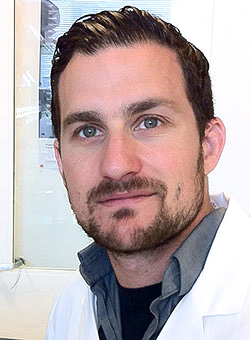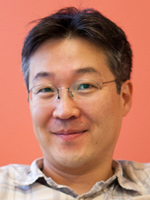Two Young UC San Diego Faculty Members Named Pew Scholars
June 13, 2013
By Kim McDonald
Two early-career scientists at UC San Diego are among 22 of the nation’s most enterprising researchers named Pew Scholars in the Biomedical Sciences by The Pew Charitable Trusts.

Andrew Huberman
These scholars will each receive $240,000 over the next four years to pursue research projects without restriction that are focused on solving some of the nation’s most perplexing health problems–including diabetes, autism, Parkinson’s disease and cancer.
Andrew Huberman, an assistant professor of neurosciences, neurobiology and ophthalmology, and Suckjoon Jun, an assistant professor of physics and molecular biology, join a prestigious community of Nobel laureates, MacArthur Fellows, Albert Lasker Basic Medical Research Award winners and hundreds of other pioneers who earned Pew grants at the start of their careers.
Huberman, who joined the UC San Diego faculty in 2010, will use his award to determine how the neurons that inform the brain about the visual world recognize and form connections with the correct targets and avoid incorrect ones. Jun, who joined the faculty in 2012, will use the funds to determine how the inner machinery of cells evolved so they can sense their size and, as they grow, when to divide.

Suckjoon Jun
“The Pew Scholars program gives innovative scientists both the freedom to take calculated risks and the resources to pursue the most promising, but untried, avenues for scientific breakthroughs,” said Rebecca W. Rimel, president and CEO of Pew. “Pew funding provides an ‘insurance policy,’ allowing our scientists to be adventurous with their research. Though their scientific fields are diverse, their commitment is uniform: harnessing scientific discovery to improve human health.”
The program is rigorously competitive. To be considered, applicants must demonstrate excellence and creativity in their research. This year, 179 institutions were invited to nominate a candidate, and 134 eligible nominations were received.
“Now more than ever, young scientists need the support to pursue untested leads,” said Craig C. Mello, a 1995 Pew Scholar and a 2006 Nobel laureate in physiology or medicine. “I am confident that these gifted scholars will make tremendous contributions to science. Their work will provide the world with new knowledge and tools to do tomorrow what seems impossible today.”
The Pew Scholars in the Biomedical Sciences award exemplifies the success being seen through the UC San Diego Young Investigator Program. The program was developed by the Office of Corporate and Foundation Relations, in collaboration with the Division of Academic Affairs and other campus partners, to connect research faculty at the start of their academic careers with the community and sources of private funding.
